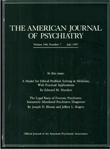Sleep Disturbances in the Vietnam Generation: Findings From a Nationally Representative Sample of Male Vietnam Veterans
Abstract
OBJECTIVE: This study analyzed questionnaire items that address complaints about sleep from the National Vietnam Veterans Readjustment Study, a nationally representative sample of the 3.1 million men and women who served in Vietnam. This study compared the frequency of nightmares and difficulties with sleep onset and sleep maintenance in male Vietnam theater veterans with male Vietnam era veteran and male civilian comparison subjects. It focused on the role of combat exposure, nonsleep posttraumatic stress disorder (PTSD) symptoms, comorbid psychiatric and medical disorder, and substance abuse in accounting for different domains of sleep disturbance. METHOD: The authors undertook an archival analysis of the National Vietnam Veterans Readjustment Study database using correlations and linear statistical models. RESULTS: Frequent nightmares were found exclusively in subjects diagnosed with current PTSD at the time of the survey (15.0%). In the sample of veterans who served in Vietnam (N=1,167), combat exposure was strongly correlated with frequency of nightmares, moderately correlated with sleep onset insomnia, and weakly correlated with disrupted sleep maintenance. A hierarchical multiple regression analysis showed that in Vietnam theater veterans, 57% of the variance in the frequency of nightmares was accounted for by war zone exposure and non-sleep-related PTSD symptoms. Alcohol abuse, chronic medical illnesses, panic disorder, major depression, and mania did not predict the frequency of nightmares after control for nonsleep PTSD symptoms. CONCLUSIONS: Frequent nightmares appear to be virtually specific for PTSD. The nightmare is the domain of sleep disturbance most related to exposure to war zone traumatic stress. (Am J Psychiatry 1998; 155:929–933)



